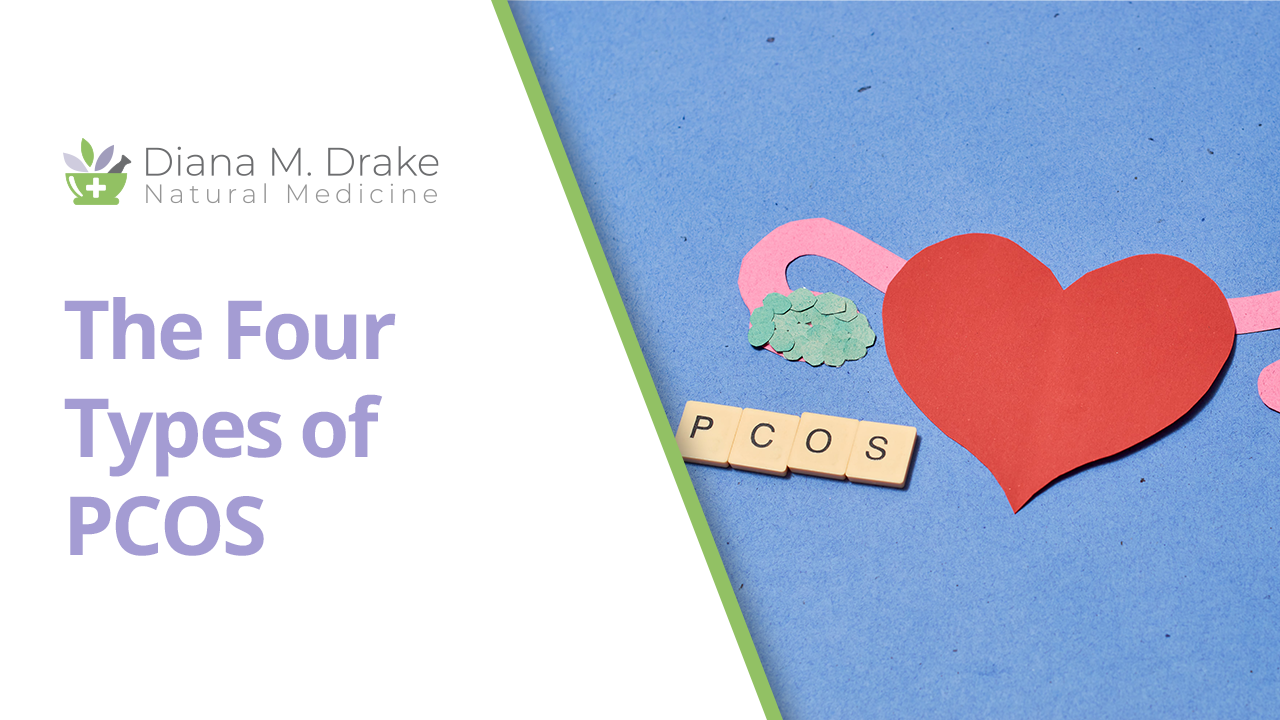The Four Types of PCOS
By Diana Drake - December 16, 2022
Did you know that there are actually four types of PCOS?
10% of women worldwide are reported to have Polycystic Ovary Syndrome (PCOS).
However, this syndrome is underdiagnosed and is suspected to affect many many more women. PCOS is a hormonal condition with various symptoms, such as ovarian cysts, painful periods, skipping periods, severe PMS, acne, excessive facial hair, blood sugar imbalances and persistent belly fat.
It is most commonly caused by having higher levels of androstenedione (a type of testosterone hormone).
Please know that if you’ve just received a diagnosis that you’re not alone, and you’ve come to the right site for all the information you need to help manage it naturally!
Let’s first look at the PCOS symptoms and then learn about the four types of polycystic ovaries.
What is PCOS?
A hormonal imbalance with notably high levels of androgens (or “male” hormones) like DHT, free testosterone and/or androstenedione.
These elevated androgens that do not properly convert to estrogens cause ovulation problems, irregular periods, infertility, and common symptoms like acne and excessive body hair growth.
You may also have trouble conceiving.

The four types of Polycystic Ovary Syndrome
When it comes to diagnosing PCOS, there are four main types:
1. Insulin-resistant polycystic ovary syndrome
Around 70% of women have this, making it the most prevalent.
In essence, insulin resistance occurs because the body has higher-than-normal insulin or hyperinsulinemia.
This happens when our cells become a little “numb” to the effects of insulin, causing the pancreas to secrete increasing amounts of the hormone until the cells understand what is happening.
You can have trouble losing weight, carry extra weight in your belly, crave sweets, and experience weariness or mental fog.
Increased androgen levels, which result in problems like too much body or facial hair, and acne; are caused by high insulin levels as well.
2. Post-birth control pill (BCP) polycystic ovarian syndrome
Some people who quit using the oral contraceptive pill develop post-pill PCOS.
In this type, symptoms like acne, irregular periods, or excessive hair growth didn’t exist before consuming these drugs.
After stopping, the ovaries produce an increased amount of androgens, and they do not properly aromatase into estrogen like they should. This creates the classic symptoms of PCOS.
There is no insulin resistance in this variety. Remember that while this can take some time to heal on its own, it can be managed more rapidly with proper nutrition, lifestyle adjustments, and supplements.
This risk after taking birth control is why it is never a good idea to take birth control to try and manage your cycle or period symptoms.
Birth control will only mask your symptoms and may cause more damage – like developing PCOS afterwords.
3. Inflammatory polycystic ovarian syndrome
Chronic inflammation causes the ovaries to produce too much testosterone, which leads to physical discomfort and problems ovulating.
Headaches, joint discomfort, unexplained exhaustion, eczema, and IBS are all indications of inflammation in this form of PCOS.
A blood test often reveals elevated inflammatory markers, such as a high CRP (C reactive protein) above 5.
Other tests, such as fasting glucose and insulin, are within the normal range but can show variations due to inflammation.
4. Adrenal polycystic ovarian syndrome
Around 10% of women with diagnosed PCOS have this making it a little more rare.
This type of PCOS is brought on by an aberrant stress reaction. High levels of testosterone and androstenedione are often absent, and DHEA-S, another form of androgen produced by the adrenal glands, will typically be raised alone.
Unfortunately, when it comes to diagnosing PCOS, this sort of androgen isn’t frequently evaluated unless you go through an endocrinologist or other expert.
Naturopathic Endocrine expert Diana M Drake at www.dmdnaturalmedicine.com specializes in natural management of PCOS.

Holistic PCOS Management
If you wish to start healing your polycystic ovaries naturally, many supplements and holistic remedies can ease your symptoms.
- N-acetyl cysteine, Myo-inositol, berberine, zinc, vitamin D, and androgen-reducing herbs such as white peony, licorice, nettles, spearmint, and reishi mushrooms; are among the supplements that have been demonstrated to aid with PCOS.This is because these ingredients tend to push down androgen levels and balance blood sugars helping the overall hormone profile.
- Curcumin and quercetin are anti-inflammatory supplements that may be helpful, especially if you have inflammatory polycystic ovarian syndrome.
- Full body detox protocols have also shown to be very beneficial for women with PCOS. This is because cleaning out the cellular receptor sites and toxins in the body will help the hormones to function properly and support normal periods.
However, remember that this hormone problem can be challenging to manage on your own.
It is a complicated series of hormonal syndromes and because there is no “cure” you will need to manage this long term with supplements.
The good news is, over time you will begin to see an improvement in symptoms. If you are having irregular periods, they should start to normalize over time.
If you are having miserable, heavy and painful periods they should begin to get easier after 90 days on the correct protocol.
